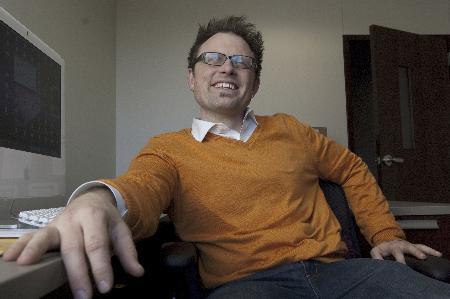Editor’s note: This story was revised for accuracy at 8:57 p.m. Jan. 25.
Most people who suffer through a debilitating illness that robs them of the ability to speak, walk or see would be hesitant to talk about their illness, much less write intimately about it.
But Alex Lemon, a professor of English, has already written two books of poetry discussing his illness. Now he is inviting readers into his private hell with his new book, “Happy: A Memoir.”
Happy was Lemon’s college nickname, a reflection of his exterior demeanor. But after having an abnormal growth in his brain stem removed in 1999, Lemon began to write.
“I was fun-loving and partying hard, and inside I was an emotional wreck,” he said.
The growth caused seizures and eventually led to drug addiction and an emotionally difficult year.
“The memoir has to do with that experience,” Lemon said. “It’s definitely a young person’s book. Being a college kid and having that happen and then being really lost and bewildered because nobody wanted to do anything about it. It was too deep in my brain. They said it probably wouldn’t happen again, and it happened again.”
Lemon said he tried not to judge himself when writing about the event from which he was more than 10 years removed.
“In a lot of ways, it felt like I was re-traumatizing myself,” he said. “Writing in the first person, present tense about somebody that you don’t really like.”
Lemon said the book covers two main points: a young man’s relationship with his mother and how college-age men relate to one another.
“More than it being about medical trauma or addiction, it’s really a book about a young man’s relationship with his mother,” Lemon said. “So it’s really a love story between a young man and his mom.”
Lemon said that it was his relationship with his mother that changed significantly during his recovery from his illness. The memoir, he said, was meant to illustrate how young men discover their love and need for their parents.
The masculinity aspect of the book comes from how he related to other men after his illness and during his recovery, Lemon said. He said men often have trouble communicating feelings, and the book was an analysis of that communication.
“I hope people think about masculinity in college, about how young men deal with mental illness and about their love for their parents and how they come to find that,” Lemon said. “So many other memoirs have to do with dysfunctional relationships and this vitriolic relationship with family. Mine is about a family that really finds themselves loving each other.”
The memoir, which is available for order on Amazon.com, has garnered plenty of reviews, some praising the openness of the writing and others criticizing Lemon’s use of offensive language.
“I think it will be off-putting to some people, which is fine,” Lemon said. “I did not want to write that book that judges those people or doesn’t frame them in a light that feels truthful.”
Lemon added that the swearing used in the book reflects the mentality of a young college student suffering through a traumatic event.
“I don’t think one ever creates a work of art or literature that pleases everyone,” he said. “I think it’s impossible, and my artistic vision was one where I already knew that some people were going to be offended by the language and offended by some of the content, and I’m fine with that.”
Lemon said only one review of “Happy” really got under his skin.
“There was an Amazon review where the person said they didn’t think they would like me,” he said. “And it was so bizarre … that night, it really bugged me. I’m fine taking criticism about the book, but when it’s like that kind of personal criticism, not located in anything, that kind of bugged me.”
But Lemon is used to facing adversity and said that writing provided an outlet to process past misfortune.
“It became easier for me to handle volatile material, the bad things that have happened to me,” he said.
Dan Williams, professor of English, said students benefit from having a published author as a professor.
“His experiences and his talent enrich our campus in innumerable ways,” Williams said. “He has contact with all kinds of publishers and writers across the country, and he has a wealth of experience about publishing and different kinds of creative writing programs and projects going on. He has an incredible amount to offer our students.”
Lemon’s poem “Being There” was published in the January 2009 issue of Esquire magazine. He has also published two other books, “Hallelujah Blackout” and “Mosquito.”

